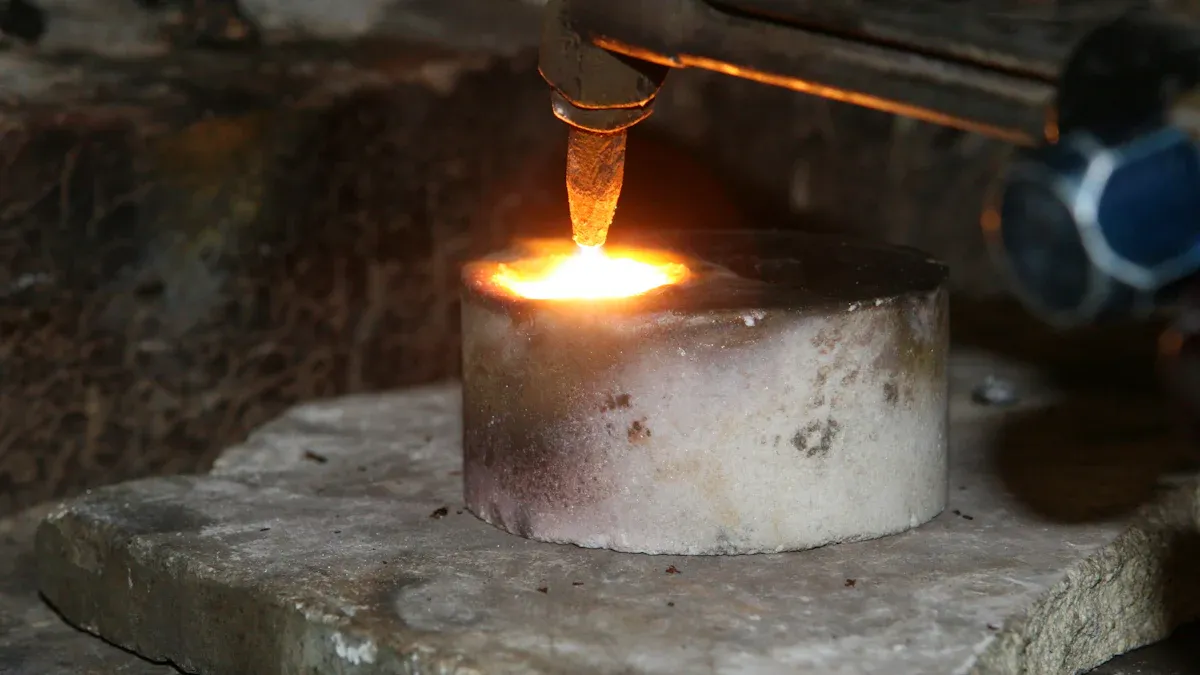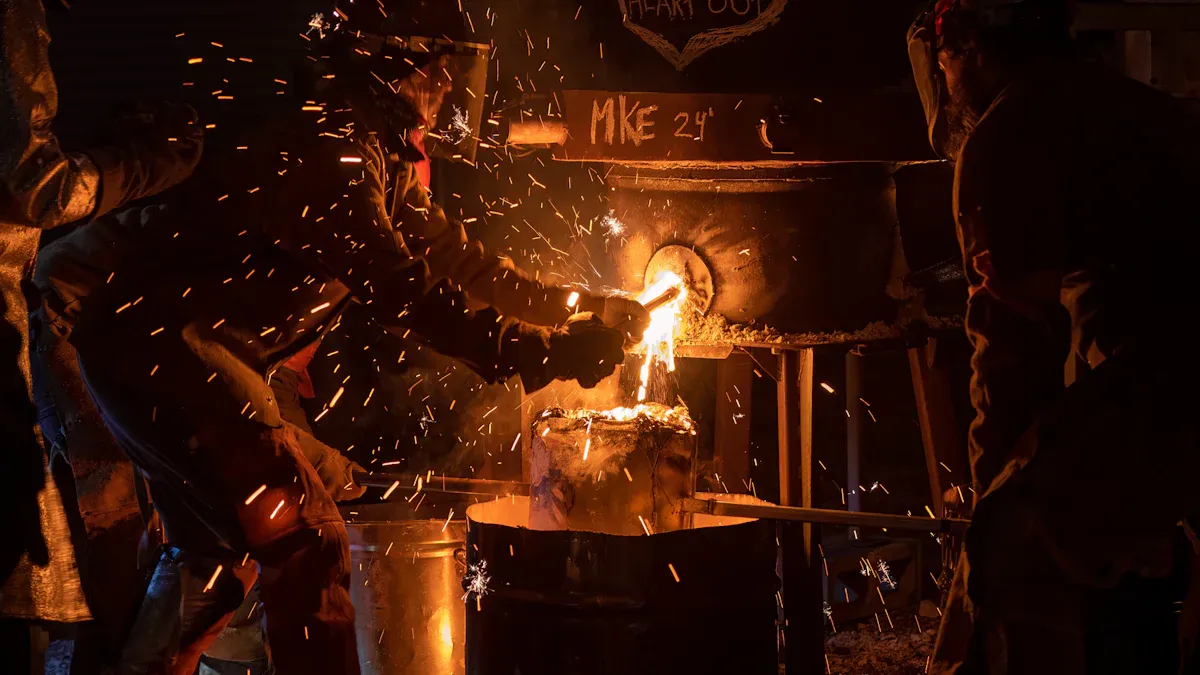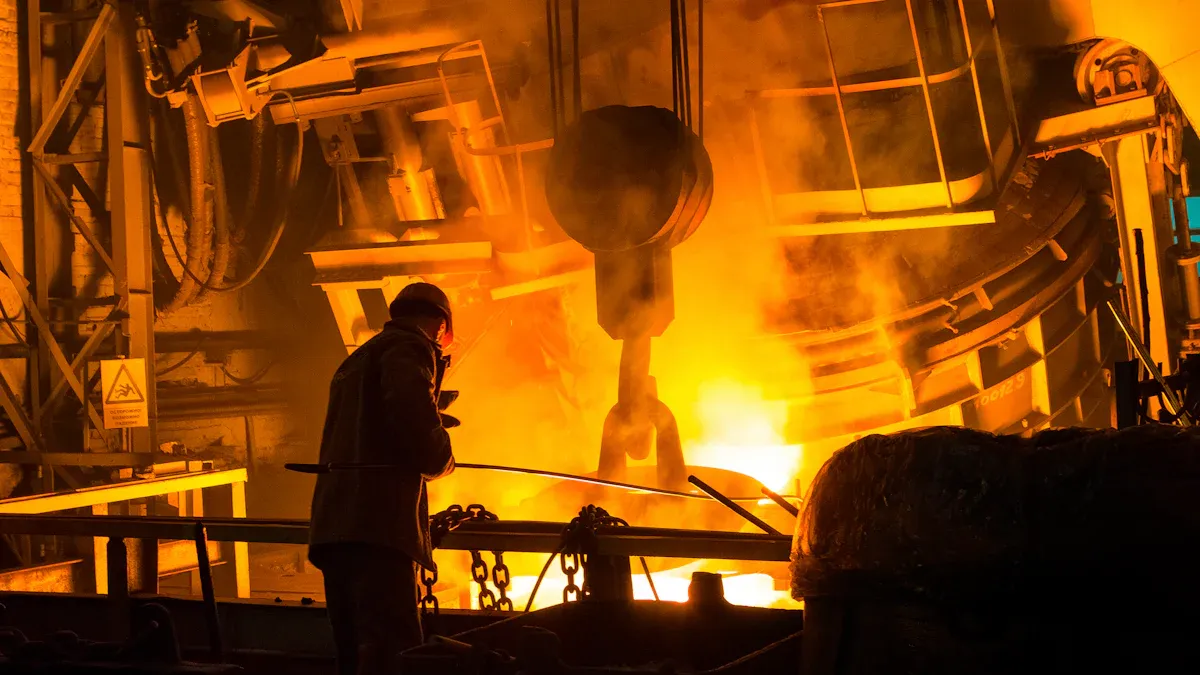
Quality matters when it comes to tin bronze precision castings for engine parts. These components directly impact engine performance and reliability. Poor-quality castings can lead to engine failure, costly repairs, or even safety risks. Ningbo Pingheng Machinery Co., Ltd. specializes in delivering high-quality solutions, showcasing the tin bronze advantage. Choosing the right supplier ensures durability and precision.
Key Takeaways
- Good tin bronze castings make engines work better and last longer. Pick suppliers like Ningbo Pingheng Machinery Co., Ltd. for strong and accurate parts.
- Check if the supplier knows their job and has certifications. Look for experience, reviews, and if they follow rules like ISO 9001 and ASTM.
- Ask for samples and check the supplier before buying. These steps make sure the castings are good and fit your engine needs.
Key Quality Factors in Tin Bronze Precision Castings

Material Properties and Composition
The material composition of tin bronze plays a critical role in its performance. This alloy, a blend of copper and tin (typically 5% to 15% tin), offers exceptional strength and corrosion resistance. Its tensile strength, ranging from 450 to 780 MPa, ensures it can handle heavy loads without deforming. The hardness, measured between 70 and 150 Brinell, makes it ideal for engine components that face constant wear.
Here’s a quick breakdown of its key properties:
| Property | Description |
|---|---|
| Composition | A mix of copper and tin (5% to 15% tin) providing strength and corrosion resistance. |
| Tensile Strength | Ranges from 450 to 780 MPa, allowing it to withstand heavy loads without deformation. |
| Hardness | Falls between 70 and 150 Brinell numbers, critical for wear resistance in components. |
| Wear Resistance | Enhanced by phosphorus, making it suitable for demanding applications. |
| Conductivity | Better than many other alloys, adding to its versatility in industrial uses. |
Ningbo Pingheng Machinery Co., Ltd. ensures that their tin bronze precision castings meet these high standards, making them a reliable choice for engine applications.
Precision and Dimensional Accuracy
Precision is non-negotiable when it comes to engine components. Tin bronze precision castings must meet exact dimensional requirements to ensure seamless integration and optimal performance. The investment casting process used by Ningbo Pingheng Machinery Co., Ltd. guarantees high accuracy, allowing for the production of complex shapes with minimal machining. This precision reduces material waste and ensures consistent quality across batches.
Durability and Resistance to Wear and Corrosion
Durability is another hallmark of tin bronze. This alloy exhibits low volume shrinkage, which aids in creating castings with precise dimensions. Additives like phosphorus, zinc, and lead further enhance its wear and corrosion resistance. Phosphorus increases hardness, zinc improves fluidity, and lead boosts machinability. These properties make tin bronze precision castings ideal for high-demand applications, such as engine components that endure extreme conditions.
Testing methods like hardness tests, tensile strength tests, and non-destructive testing ensure that each casting meets durability standards. Ningbo Pingheng Machinery Co., Ltd. employs these rigorous protocols to deliver castings that stand the test of time.
Evaluating a Tin Bronze Precision Casting Supplier
Supplier Expertise and Industry Experience
A supplier’s expertise can make or break the quality of tin bronze precision castings. Look for manufacturers with years of experience in the industry. Their track record often reflects their ability to handle complex projects and deliver reliable results. For example, Ningbo Pingheng Machinery Co., Ltd., established in 1999, has decades of experience in precision casting. They specialize in tin bronze and other copper alloys, serving industries like automotive, marine, and engineering machinery.
When evaluating expertise, consider these key indicators:
| Indicator | Description |
|---|---|
| Customer Feedback | Insights from past clients about the supplier’s reliability and performance. |
| Case Studies | Examples of successful projects that highlight the supplier’s capabilities. |
| Manufacturing Capabilities | Advanced technology and facilities, such as CNC machining, for precision. |
| Delivery Options | Ability to meet deadlines and handle urgent or custom orders effectively. |
Suppliers with proven expertise ensure consistent quality and performance in every casting.
Certifications and Quality Control Processes
Certifications and quality control processes are essential for ensuring high standards. Reputable suppliers, like Ningbo Pingheng Machinery Co., Ltd., adhere to strict protocols to maintain quality. They follow industry standards such as ISO 9001 and ASTM compliance, which guarantee that materials and processes meet specific requirements.
Here’s a quick overview of common certifications and processes to look for:
| Certification/Process | Description |
|---|---|
| ISO 9001 | Ensures a robust quality management system. |
| ASTM compliance | Verifies that materials meet international standards. |
| Rigorous Testing | Includes hardness, tensile strength, and dimensional accuracy tests. |
| Non-destructive Testing | Uses methods like X-ray or ultrasonic inspections to detect internal flaws. |
| Production Monitoring | Continuous oversight to minimize defects and ensure consistency. |
These certifications and processes demonstrate a supplier’s commitment to quality and reliability.
Customer Feedback and Case Studies
Customer feedback and case studies provide valuable insights into a supplier’s performance. Positive reviews highlight their ability to meet client expectations, while case studies showcase their expertise in handling specific projects. For instance, Ningbo Pingheng Machinery Co., Ltd. has a history of delivering high-quality tin bronze precision castings for demanding applications, such as marine and automotive components.
Here are some ways feedback and case studies can guide your decision:
- Customer reviews reveal real-world experiences, helping you assess product quality and service reliability.
- Case studies demonstrate how suppliers meet unique project requirements, ensuring client satisfaction.
- Examples from industries like marine and aerospace highlight the durability and performance of tin bronze components under extreme conditions.
By analyzing feedback and case studies, you can make informed decisions and build trust in your supplier.
Ensuring Compliance with Industry Standards
Importance of ISO and ASTM Certifications
Certifications like ISO and ASTM are more than just labels. They act as a guarantee that the materials and processes meet global standards. For tin bronze precision castings, these certifications ensure consistent quality and performance. ISO 9001 focuses on quality management systems, helping manufacturers maintain high standards throughout production. ASTM certifications, on the other hand, verify that the alloy composition and mechanical properties align with international benchmarks.
Ningbo Pingheng Machinery Co., Ltd. adheres to these certifications, ensuring their castings meet stringent requirements. This commitment to compliance gives customers confidence in the reliability of their engine components.
Adherence to Engine-Specific Standards
Engine components often require compliance with industry-specific standards. These standards ensure that the castings can handle the unique demands of engines, such as high temperatures and constant wear. For example, automotive and marine industries may have distinct requirements for material strength and corrosion resistance. Suppliers like Ningbo Pingheng Machinery Co., Ltd. tailor their production processes to meet these specific needs.
By adhering to these standards, manufacturers ensure that their castings integrate seamlessly into engines, delivering optimal performance and longevity.
Testing and Inspection Protocols
Testing and inspection protocols play a critical role in ensuring the reliability of tin bronze precision castings. Manufacturers implement rigorous testing to verify material properties and dimensional accuracy. Non-destructive testing methods, such as ultrasonic or X-ray inspections, detect internal flaws without damaging the product. Hardness and tensile strength tests confirm that the alloy meets performance requirements.
Inspections occur at every stage of production to catch defects early. Advanced tools like coordinate measuring machines (CMM) ensure components meet exact specifications. Ningbo Pingheng Machinery Co., Ltd. employs these methods to deliver castings that meet the highest quality standards.
Tip: Always ask your supplier about their testing and inspection processes. This step ensures you receive components that meet your expectations.
Tips for Verifying Quality Before Purchase

Requesting Samples and Prototypes
Before committing to a supplier, requesting samples or prototypes is a smart move. These allow buyers to assess the quality of tin bronze precision castings firsthand. Samples provide a tangible way to evaluate material properties, dimensional accuracy, and surface finish. For instance, Ningbo Pingheng Machinery Co., Ltd. offers prototypes that showcase their precision casting capabilities. This step ensures the castings meet specific engine requirements and perform reliably under demanding conditions.
Prototypes also help identify potential design flaws early. By testing these samples in real-world scenarios, buyers can confirm that the castings align with their performance expectations. This proactive approach minimizes risks and builds confidence in the supplier’s expertise.
Conducting Supplier Audits
Supplier audits are essential for verifying a manufacturer’s quality control processes. Visiting the production facility offers insights into their operations, from raw material selection to final inspections. During an audit, buyers should look for practices like non-destructive testing (NDT) and hardness tests. These methods ensure the castings meet performance standards without compromising structural integrity.
Here’s a quick overview of key quality control practices to observe:
| Quality Control Practice | Description |
|---|---|
| Rigorous Testing Processes | Ensures material properties and dimensional accuracy are verified. |
| Non-Destructive Testing | Methods like ultrasonic or X-ray inspections detect internal flaws without damaging products. |
| Hardness and Tensile Strength Tests | Confirm that the alloy meets performance requirements. |
| Monitoring Production Stages | Involves oversight from alloying to finishing to minimize defects and ensure consistent quality. |
Ningbo Pingheng Machinery Co., Ltd. implements these practices, ensuring their tin bronze precision castings meet the highest standards.
Reviewing Technical Documentation
Technical documentation provides a detailed look at the manufacturing process and quality assurance measures. Reviewing this information helps buyers understand how the supplier maintains consistency and precision. For example, Ningbo Pingheng Machinery Co., Ltd. uses advanced tools like simulation software to predict and eliminate defects during production. Their continuous monitoring systems collect real-time data, ensuring optimal casting conditions.
Buyers should also check for automation in processes like pouring and grinding. Automation enhances efficiency and reduces human error, resulting in flawless castings. By thoroughly reviewing technical documentation, buyers can verify that the supplier employs cutting-edge techniques to deliver reliable components.
Tip: Always request detailed documentation, including test reports and process flowcharts. This ensures transparency and helps you make informed decisions.
Choosing high-quality tin bronze precision castings is vital for engine performance. Reliable suppliers like Ningbo Pingheng Machinery Co., Ltd. ensure durability and precision through rigorous testing methods.
- Foundries use ultrasonic and X-ray inspections to detect flaws.
- Hardness and tensile strength tests confirm the alloy’s reliability.
Requesting samples and conducting audits help buyers verify quality. Prioritizing these steps avoids costly mistakes and ensures engines run smoothly.
FAQ
What makes tin bronze a good choice for engine components?
Tin bronze offers excellent strength, wear resistance, and corrosion protection. Ningbo Pingheng Machinery Co., Ltd. ensures these properties through precise alloy composition and advanced casting techniques.
How does Ningbo Pingheng Machinery Co., Ltd. ensure casting accuracy?
The company uses the investment casting process, which delivers high precision and dimensional accuracy. This method minimizes material waste and ensures consistent quality for every engine component.
Can Ningbo Pingheng Machinery Co., Ltd. customize castings for specific engines?
Yes! They tailor their production to meet unique engine requirements. Their expertise in tin bronze and other alloys ensures compatibility and optimal performance for various applications.
